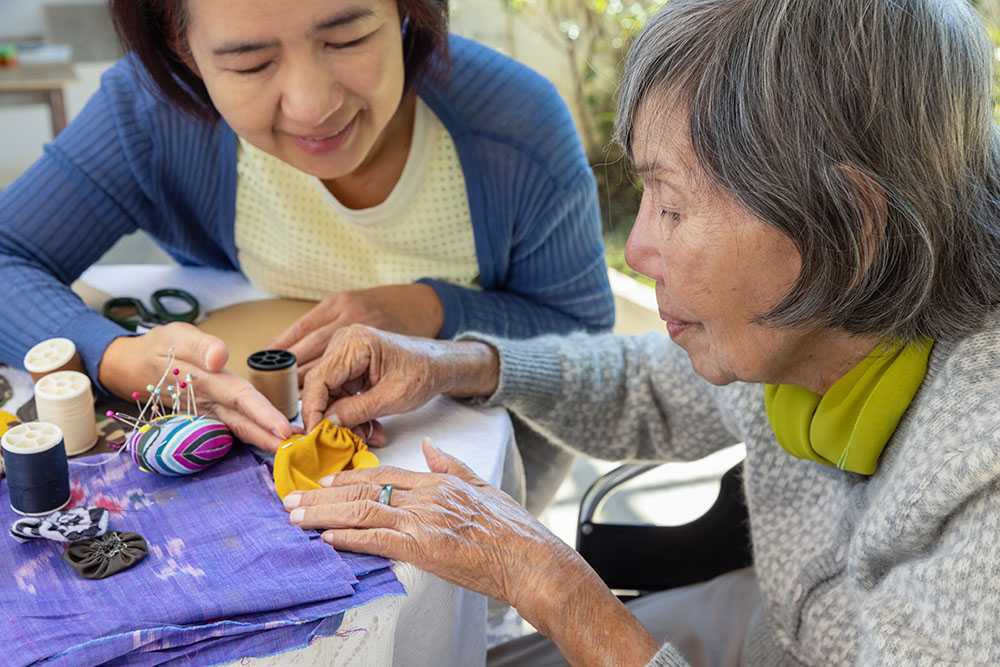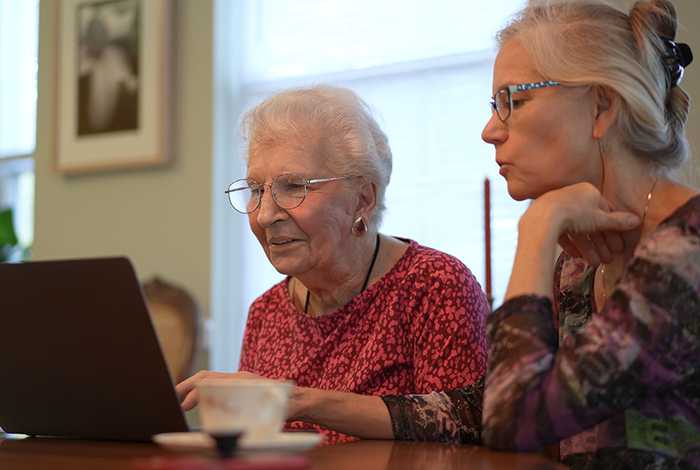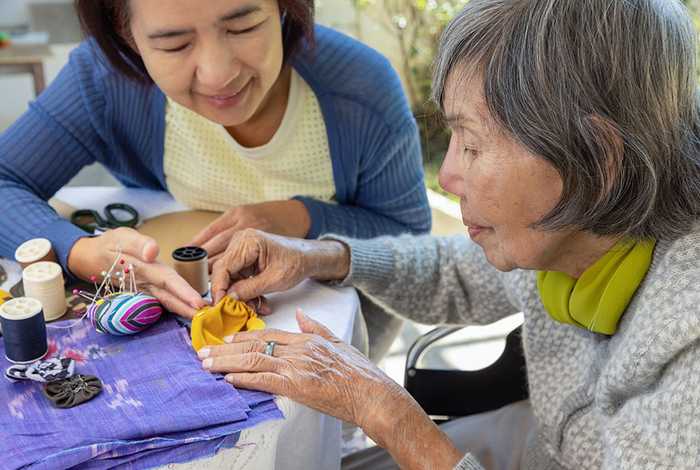Posted by Janine Griffiths
Person centred care and dementia: A guide for families

When someone you love is living with dementia, it’s natural to want more than basic support - you also want reassurance that their individuality, history, and daily needs are genuinely understood.
This is one of the main principles behind person-centred care.
But what does that really mean in practice, and when it comes to person centred care and dementia, how does this approach translate into daily actions and interactions?
Providing person-centred care is about taking a more holistic approach and ensuring that the focus goes beyond just carrying out routines and tasks.
The real measure of quality lies in whether the care is tailored to the individual.
To understand it more deeply, we spoke with Danine Irwin, Head of Innovation, Research and Development at Dementia Adventure. She explains what person-centred care involves and how it works in practice for people with dementia. In addition, she highlights what families should look for when seeking person-centred care and dementia support beyond the basics.
What is person centred care?
Person-centred values in care are about seeing the individual beyond their diagnosis or daily needs. It means paying attention to personal preferences, habits, and perspectives, and ensuring these unique aspects shape everyday support.
Person-centred care means treating people with dignity through kindness and respect, recognising their individuality and life experiences, and supporting independence so they can do as much as possible in their own way. It values patient choice in both small and big decisions, protects equal rights such as privacy and safety, and builds an equal partnership where care is shaped with the person, not simply for them.
According to Danine, it is always important to take a holistic approach.
She added: “You will have a much better relationship with the person you care for if you understand how important a person-centred approach is – whether that’s when loved ones are living at home together, or when someone is in a residential care setting.
“Supporting someone with a person-centred approach helps that person to maintain their identity, reduces distress for the person living with dementia, and it builds trust. Families can be reassured, and the outcome is better not just for the person living with dementia, but also for the family caregivers.”
This emphasis on emotional wellbeing and partnership is more than just good practice – it’s also backed by research. Studies have shown that when care is tailored to the individual, people living with dementia often experience fewer behavioural symptoms, improved mood, and stronger relationships with those supporting them.
According to a study by the National Institute for Health and Care Research (NIHCR), a person-centred approach to dementia can improve quality of life, reduce agitation and improve interactions with care staff.
But what does that really look like in day-to-day practice? As Danine explains: “When you are supporting someone living with dementia, you’re looking at the person, the individual, before you look at the dementia. It’s about focusing on the individual preferences, their life story and their values, rather than just the dementia.”
However, delivering genuine person-centred care takes more than good intentions – it requires the right training and awareness. Danine added, “With the right education and the right training, professional care teams can understand how important it is to make sure they’re implementing person-centred care and relationship-based approaches.”
Training helps carers shift away from purely task-based routines and instead see the individual behind the condition. According to Danine, this means understanding that “all the support you’re providing is with the person in mind, not for the person.”
Challenges with delivering person-centred care
According to Danine, it can be challenging for those that are not professionally trained in person centred care and dementia treatment to understand how to balance respecting an individual’s preferences with meeting their practical care needs.
She said: “I think it's very easy for someone who's caring for somebody that is living with dementia to do things for them. It can be quicker for carers just to do things themselves, perhaps because things are a bit slower or taking a bit longer doing it with the person.”
Although person-centred care has been widely embraced across the UK, Danine believes that there needs to be more funding and policy changes to facilitate a holistic approach to dementia in the UK.
“I feel that the residential care settings are very much task orientated, and with slightly more funding, more support, more training at the very basic level, it will be embedded that person centred approaches and relationship based care is fundamental.”
Importance of nature and the outdoors in dementia care
The benefits of engaging in sensory activities like spending time outdoors go far beyond simply enjoying fresh air.
Nature offers opportunities for engagement, relaxation, and connection that can support emotional wellbeing, stimulate memories, and encourage gentle physical activity.
Danine explains that incorporating outdoor experiences into care isn’t just a nice addition - it’s a powerful way to see the person, not just the condition.
She said: “It's innate for us to want to be able to be outside. So I think for anybody who is supporting someone living with dementia, it is important to be outside, getting fresh air stimulation outdoors. It's multi-sensory.
“It enhances the physical and the mental wellbeing. It's uplifting for the mood and the mental health, and also these activities are very reminiscent and emanate lots of memories from outdoor trips, being in gardens or in parks.
“It also naturally gives a very large sense of freedom, and I think it's very important for someone who's living with dementia, at a time when perhaps their world is slowly shrinking around them. So getting outside is really important.
“You can stimulate all the senses through the sense of smell, touch and seeing beautiful flowers and nature. I understand that some of this can be over stimulating, but in small amounts and in controlled environments where it's supported, this can be really, really uplifting for somebody living with dementia.”
Danine emphasises that even when something seems clearly beneficial, it’s essential to involve the person in the decision-making, adding: “It is also important to allow people to have the choice and the control of the situation, rather than overtaking. Involving them could include things like asking them if they want to go outside, asking if they want to sit by a window or getting their permission to leave a window open.”
Person-centred care and dementia: The role of technology
Technology can also play a role in providing individualised person-centred care for those living with dementia, according to Danine.
She acknowledges that while some tech is still novel, its greatest strength in dementia care is its capacity for personalisation, which is the very heart of a person-centred approach.
She explained: “Technology can be things like MP3 players, where people can have a personal headset and listen to their own playlist of music... it's person centred, because they can choose the music that they wish to have on their MP3."
"There's also use of devices like Alexa, where people can actually ask Alexa to tell them a story, tell them a joke or they can find out what the weather forecast is. It can be used to set reminders for people. So it could even send reminders when it is time to go outside into the garden for 10 minutes.
“There are also lots more modern ways of engaging with technology, using things like virtual reality. They can be individualised for the person who's wearing it, and perhaps there is an opportunity for people with dementia to enjoy virtual reality.”
Your search for truly person-centred care starts here
Autumna provides the tools and guidance to connect you with the ideal care for you and your loved one.
Begin by exploring our comprehensive online directory. Simply enter your location, select the care service you need, and browse your options. To refine your results, use our filters to highlight the features that are most important to you.
If you’d like a hand-picked selection, try our free shortlisting service. In just a couple of minutes, you can answer a few simple questions and receive a customised list of providers matched to your situation.
Would you rather speak to a human? Call our expert advisors on 01892 335 330 for friendly, no-pressure guidance and support in finding the right care for your loved one.
Need some help finding care services or retirement properties?
Let our expert team of advisers get your search off to a great start.
Tell us a little about your needs and we'll send you a bespoke shortlist of options! Click the button below to begin, it takes just a few minutes.
Other articles to read
From the blog

Older Persons Care Advice
Ultimate guide to jointly owned property and care home fees
September 26th, 2025
Understand jointly owned property and care home fees, how assessments work, and steps to protect your finances and plan ahead with confidence.

Older Persons Care Advice
What are the pros and cons of care homes?
September 26th, 2025
Weigh the pros and cons of care homes to make the right choice for you or a loved one. Discover benefits, challenges, and tips for finding the best fit.

Older Persons Care Advice
Person centred care and dementia: A guide for families
September 23rd, 2025
Discover how person centred care and dementia support go hand in hand. Learn practical tips, expert insight, and guidance for families seeking the best care.
Frequently Asked Questions
Person centred care means focusing on the individual rather than the diagnosis, respecting their preferences, life story and daily choices while supporting independence and dignity.
It helps maintain identity, reduces distress, improves relationships with carers, and enhances overall quality of life for both the individual and their family.
Look for carers who involve your loved one in decisions, adapt activities to their preferences, respect their routines, and create opportunities for choice and autonomy.
Yes. Tools like personalised music playlists, smart devices for reminders, or even virtual reality can enrich daily life when tailored to the individual’s needs and interests.
Person centred care and dementia support go hand in hand. Person centred care means taking a holistic approach to an individual’s health and wellbeing.






